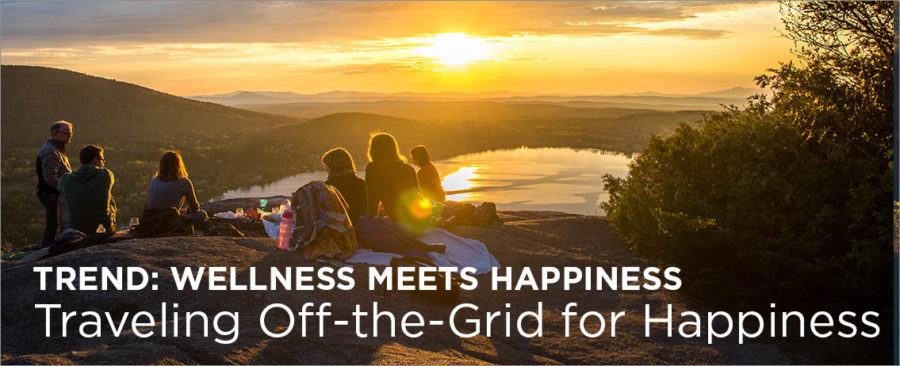TREND: Wellness Meets Happiness

Traveling Off-the-Grid for Happiness
Smartphones/screens have shackled people to bad news, social media, and work every waking minute, decimating work-life balance; sleep; and any true peace, human connection or contemplation (as well as destroying vacations). It’s creating new desires to leave the shrieking world behind. So, the biggest trend in wellness travel is destinations that are off-the-grid or deep in nature but that also focus on meaningful human community.
More destinations are explicitly about cutting the digital cords. For example, Mandarin Oriental spas’ Digital Wellness experience, with all phones silenced and even a silence ceremony at check in. Or Time to Log Off Retreats in rural Puglia, Italy, where every screen is switched off on arrival, and your time is spent doing yoga, meditation, cycling and walking on the beach (with a digital disconnection toolkit to take home). Or at Camp Grounded in Mendocino, CA, a screen-free adult summer camp, where happy childhood experiences, such as kickball, archery and campfires with s’mores, rush in to fill that Instagram withdrawal.
The happiness science shows us that tech disconnection and more human connection is a path to happiness—so you could call the trend a new “happiness travel.” We’re even seeing new wellness resorts explicitly designed around the science of happiness, such as Six Senses Bhutan, where guests are immersed in five key pillars of Bhutan’s “Gross National Happiness Index.”
Remote destinations (where you hear little but the sacred silence of nature) plus human community is the new luxury. And when wellness destinations are simply off the grid (sorry, boss, I have no signal…), the disconnection feels natural. Like at Eremito, the intimate “wellness monastery” set in a natural preserve in Umbria, with no Wi-Fi or phone signal, silent candlelit group dinners and always-booked 50-hour silent retreats.
Forecasting The Future
The last year was the beginning of a backlash against Big Tech, as we all slowly start to grasp what a disastrous effect constant digital connection has on our brains and happiness. We’re at a moment with digital addiction somewhat analogous to where the smoking issue was decades ago: an initial reluctance to believe how bad it is for you that gets overwhelmed by evidence.
In the future, cutting the digital cords to reclaim our minds and happiness will become cooler. More businesses will help us—from tech-fighting tech that sets parameters on screen-time to more restaurants, spas, gyms and stores becoming digital-free zones. The future of wellness travel (increasingly, the very brand) are more havens of nature, contemplation and human connection.
Another future for “happiness travel”: people are specifically seeking the happiest nations to experience their unique wellbeing traditions. Every year, the World Happiness Report ranks 110+ nations for “overall happiness” and every year, the Northern European nations totally dominate. The top ten in 2018 were: Finland, Norway, Denmark, Iceland, Switzerland, Canada, The Netherlands, New Zealand, Sweden and Australia. It’s utterly fascinating how much people have been obsessed of late with the indigenous “wellness trends” from the happiest countries—whether Danish hygge (creating cozy environments for close connection) or lagom (the Swedish everything-in-moderation concept) or the Japanese philosophy of ikigai (embracing what you love and what the world most needs from you).
In an increasingly unhappy world, people seem to crave what the happiest nations get right, and we predict more travelers will pack up to experience it at the source. And it is part of a wider shift (or expansion) in wellness: from products and treatments to a thirst for philosophies/life practices that will actually make you happier and healthier—for cultural knowledge rather than commercialized wellness.
This is an excerpt from the TRENDIUM, a bi-weekly communication exploring the wellness trends identified in the 2018 Global Wellness Trends Report.
Subscribe to the TRENDIUM | View TRENDIUM Issues